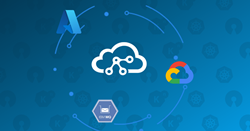
New release from TriggerMesh expands multi-cloud capabilities, accelerates app modernization
Enterprises are looking for an open source alternative to monolithic, proprietary, and expensive iPaaS systems. With the new capabilities in this latest release, TriggerMesh provides these businesses with a very clean on-ramp to cloud-native integration. – Sebastien Goasguen, TriggerMesh
RALEIGH, N.C. and GENEVA (PRWEB)
March 10, 2022
TriggerMesh, a cloud native integration platform provider, today announced its latest open source release with expanded Azure and Google Cloud Sources and key features to accelerate application modernization. The release is aimed at simplifying multi-cloud application and data integration and accelerating application modernization, in particular for enterprises using IBM MQ.
To help architects and developers consume messages from multiple clouds, TriggerMesh now supports all the following Azure and Google Cloud Event Sources out of the box:
Azure Sources:
- Azure Activity Logs, Azure Blob Storage, Azure Event Grid, Azure Event Hub, Azure IoT Hub, Azure Queue Storage, Azure Service Bus Queue, Azure Service Bus Topic
Google Cloud Sources:
- Google Cloud Audit Logs, Google Cloud Billing, Google Cloud IoT, Google Cloud PubSub, Google Cloud Source Repositories, Google Cloud Storage
“Our ever-growing catalog of supported event sources for AWS, Azure, Google Cloud, SaaS tools like Salesforce, and streaming tools like Apache Kafka helps multi-cloud enterprises with a variety of use cases, such as building a security notification system across clouds to improve cloud governance,” said Sebastien Goasguen, TriggerMesh Co-Founder and Head of Product.
A complete list of Event Sources, Targets, and Connectors can be found here.
This release also adds IBM MQ as an open source Event Source and Event Target. These features help developers modernize legacy MQ applications and develop cloud-native applications that are containerized and run in Kubernetes. For example, an enterprise can now use TriggerMesh open source to quickly expose a REST API in front of a legacy mainframe system of record.
In tandem with the IBM MQ support, this release also includes two data Transformations to automate and scale the handling of XML data into cloud-native applications. The new XSLT Transformation and XML to JSON Transformation equip developers with out of the box XML transformation logic.
Finally, and also in support of IBM MQ and other legacy messaging systems, this release includes a synchronizing mechanism, which provides an API that uses a correlation id to wait for specific events answering to a request. Synchronizer can be used in conjunction with the IBM MQ Source and Target to build a synchronous API from an asynchronous event flow.
“Enterprises are looking for an open source alternative to monolithic, proprietary, and expensive iPaaS systems,” added Goasguen. “With the new capabilities in this latest release, TriggerMesh provides these businesses with a very clean on-ramp to cloud-native integration.”
About TriggerMesh
TriggerMesh simplifies building event-driven applications using data and events from any platform and cloud service. Applying the concepts of “infrastructure as code” to application integration, cloud operators and DevOps practitioners use TriggerMesh to build event-driven integrations. TriggerMesh accelerates time to value, codifies application and data flows in an enterprise platform, and supports the move to an event-driven enterprise.
Share article on social media or email:

